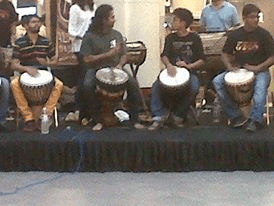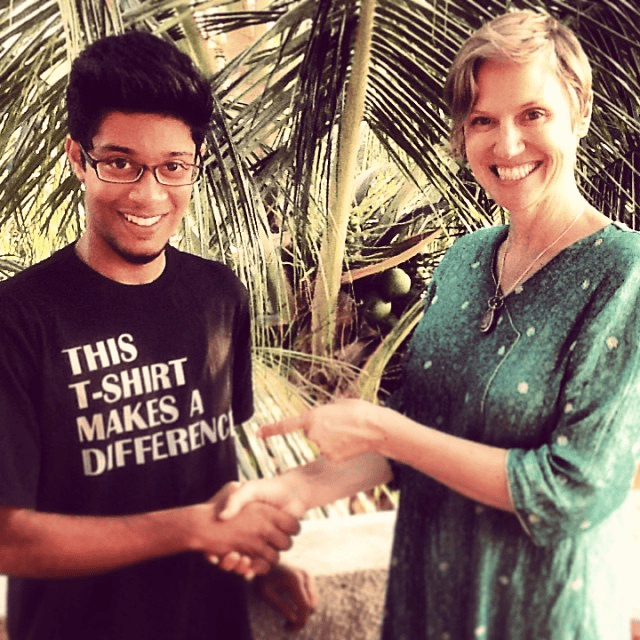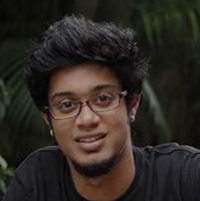I came to know about Mamady keïta later in my musical journey but these are the words a musician should live by.
I have always been inclined towards music since i was a kid, be it sitting beside a Thavil (South Indian barrel shaped drum) player in wedding ceremonies or attending classical concerts with my family. This led to me learning hindustani music and tabla during school and I continued pursuing it.
The first time I heard the Djembe or about Taal Inc. for that matter was back in the monsoon of 2013 at this place called Muziclub where Varun was doing a demo for the students on one of their Sunday jams. This was unlike any other demo’s I’d seen, lots of people on stage playing these unusual instruments. Other than the Djembe everything else was a ‘Nashik dhol’ for me. All of this sounded pretty cool but then it was a demo, so more fun and less music.
Djembe didn’t really come to my mind again till my band’s drummer said that he’s learning this thing called djembe from Varun Venkit and invited me to Max Muller bhavan just a few months later for a Taal Inc. Student’s Ensemble (fanciest name for a band I’d heard in my 9th std.) gig on World Music Day. This was when I heard what West African music really was. It was so groovy, simple, intricate and fun all at the same time. I memorised the Djole song right then and there, that’s how much i loved the performance. When my friend introduced me to Varun, his words were – “man he was singing the songs and all” and proceeded for a high five.

My first class
The same weekend I Djembe Drum Lessons For Beginners with Taal Inc. My first lesson was the rhythm Liberté. This was when I got to know of Mamady Keïta.
The rhythm was pretty easy for me coming from a Tabla background, but the sounds were the most difficult thing about learning the djembe. I’d practice on my study table, I’d practice on my desk in school, I kept verbalising the rhythms and showing them to my friends on this really bad conga that we had at our school. I never skipped my African Drum Lessons. Rahul Swaminathan was my primary teacher back then, till I reached the intermediate level where a selected bunch would have a class with Varun. I practiced on my djembe all the time. My fingers once bled while practicing my first original solo which was Soli Rapidè. (For the record, I’m in no way, endorsing bleeding hands as a sign of something to work toward. Many a time it’s a sign of not-great technique)

A year or two down the line, Taal Inc. was doing a Drum-a-thon where drumming was supposed to continue for 10–12 hours straight without a break. I joined in and played for about 6 hours. I didn’t feel my hands hurt. I was just lost in the music, the energy, everyone was laughing and having the time of their lives. The next day, I wasn’t able to brush my teeth, that’s when I felt the pain. Djembe is something where you just lose yourself in the music (eminem was right), you forget about everything else, it’s just the djembe, the ensemble, the energy and you.
The Taal Inc. drum-a-thon

In a few years i finished my TTMDA (Tam Tam Mandingue Djembe Academy ) level 1 and 2, with Tara Tucker (teacher and player extraordinaire from Australia). I now got a glimpse of the bigger picture, of TTMDA International and the other djembe players from all over the globe. Tara gave me a few pointers on how to play the Tone and Slap the right way and how the hands should look when playing the djembe (looks do matter).
Around 2017, Varun called me up and asked me if I was interested in taking classes. I obviously said yes. I used to attend the beginner batch and intuitively understood how to conduct Drum Classes. I attended a few drum circles with Varun and the other facilitators to understand how to interact with students. Varun also taught me how to teach students with additional needs. This opened up new avenues for me. Up until now it was me learning and playing. Now, it had to be me working with others. Teaching and learning djembe taught me patience, understanding, tolerance and just being happy.
“No matter what our colour is, when cut open, our blood is always red.” – Mamady Keïta
Djembe and west African music also teaches you about life, respect and gender equality. Every rhythm you learn has a history behind it, there’s always a reason to play a particular rhythm. West African culture is very wholesome. There’s always love for each other, there’s hope, respect and equality.
Throughout my djembe life, I’ve met people who are always loving and happy. Djembe is a way of life, you can never go wrong in this. Djembe will always make you smile, it’ll help you forget the bad, it’ll improve your health, mentally and physically.
Now it’s been over 7 years since I’ve started playing the djembe and there hasn’t been a single day where I have regretted it in any way. Let your fingers bleed, let them hurt, music will always help you get through it.
Learn the djembe online.To know more click here:-https://www.taalinc.net/online-classes/
WASSA WASSA!!! (A celebratory shout to mean ‘Happy Happy’)
Aditya Gopalakrishnan
Djembe Teacher, Taal Inc.

A sound engineer by profession, Aditya is a beginner djembe teacher with us and is the youngest member of Team Taal Inc. He is a musician who sings, plays the guitar, programs and also composes music. Read More
